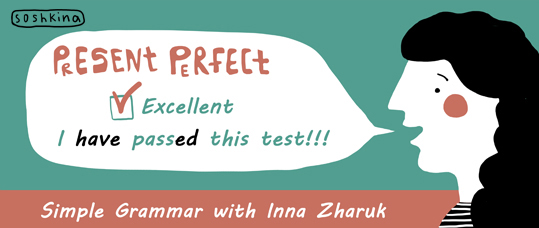Present Perfect
It is an interesting and often used tense, so what do we know about it?
Formation
We form the Present Perfect using have or has + regular verb with ending -ed or irregular verb in the third column in the irregular verb list.
For example:
We have listened to the podcast.
(listen is a regular verb so we add -ed)
We have always been very happy together.
(be is an irregular verb be – was/were – been so we use the third form been)
Also, pay attention to using have and has. Has is used with he, she and it, while have is used with I, we, you and they.
He has written a book.
I have written a book.
So let's listen to the formation of positive, negative sentences and questions.
He has climbed a mountain.
He hasn't climbed a mountain.
Has he climbed a mountain? Yes, he has or No, he hasn't.
They have swum one kilometer.
They haven't swum one kilometer.
Have they swum one kilometer? Yes, they have or No, they haven't.
Usage
There are three main rules to use the Present Perfect.
1. We want to express an action that happened in the past but we don't say a definite time or we don't know it.
My sister has bought a car.
(We don't say when she did it: yesterday, or an hour ago because the exact time isn't important)
We have downloaded twenty Android applications.
(the specific time is unknown and unimportant)
2. We want to talk about a past experience and again we don't specify the time.
Have you been to Cuba?
(We ask about a personal experience)
My mom has never travelled by plane.
(No experience is also an experience)
3. We want to list the results. Remember, you cannot mention a specific time.
Richard has crossed the Atlantic Ocean in an airballoon five times.
(His result is five times)
Stephen has published two hundred books.
(Stephen's result is two hundred books)
Time phrases
We use the Present Perfect with the following time phrases: already, just, never and ever, yet, before, this month, etc.
Already, just, never and ever. They are used after the auxiliary verbs have/has and before the main verb.
I have already had my lunch.
I have just seen Lucia.
Has he ever been to Tahiti?
He has never been to Tahiti.
Yet is used at the end of the question or negative sentences.
Have you finished your report yet?
Before we use at the end of the sentence.
I have never met him before.
This week, this month, etc. You can use this phrase at the beginning or the end of the sentence.
I have started a new job this week.
I hope the information was useful for you and at last you have understood when and how to use the Present Perfect.
















